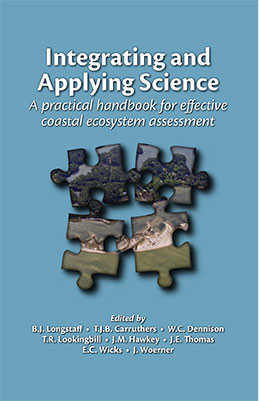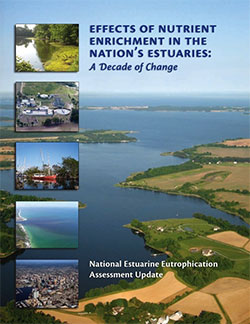Ending a NOAA partnership and beginning a new EcoCheck chapter
Bill Dennison ·EcoCheck was formed in 2004 as a partnership between the University of Maryland Center for Environmental Science (UMCES) and the National Oceanographic and Atmospheric Administration (NOAA). It was created by Drs. Bill Dennison (UMCES) and Bob Wood (NOAA) to develop ecological forecasting and environmental reporting capacity in the Chesapeake Bay. The original staff were recruited from Queensland Environmental Protection Agency, Australia (Dr. Ben Longstaff) and the Horn Point Laboratory (Dr. Xinsheng Zhang and Caroline Wicks). EcoCheck staff offices were located in a purpose built building on the campus of the Oxford Cooperative Laboratory, a joint venture between Maryland Department of Natural Resources and NOAA.
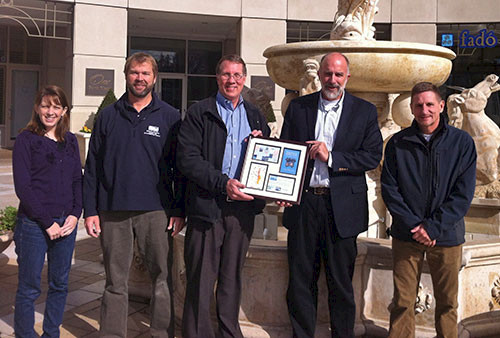
Eleven scientists worked for EcoCheck over the course of the partnership with NOAA. EcoCheck was originally led by Dr. Ben Longstaff, followed by Dr. Heath Kelsey and then Caroline Wicks. Various Science Integrators and Science Communicators worked for EcoCheck in chronological order; Dr. Xinsheng Zhang, Kate Boicourt, Emily Nauman, Christine Thurber, Sara Powell, Melissa Andreychek, Alexandra Fries and Dr. Jonathan Kellogg. Four of these staff currently work for the Integration and Application Network (Kelsey, Fries, Kellogg and Wicks) and one for NOAA (Zhang).
EcoCheck has produced annual report cards for Chesapeake Bay beginning in 2006. These report cards are supported by extensive web materials including data tables, graphs, diagrams and maps. In addition, ecological forecasts, summer tracking and summer review were conducted each year to form an annual communication cycle. These communication events have been widely covered by the popular media. In addition, several peer review publications 1 2 3 were published on the Chesapeake report card.
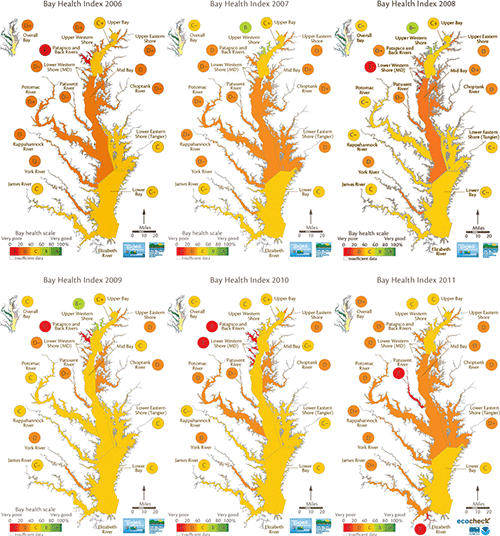
EcoCheck staff led the effort to produce the book Integrating and Applying Science: A practical handbook for effective coastal ecosystem assessment, published in 2010 by IAN Press. This 244 pp. book was co-authored by 29 scientists. It was written to provide a step-by-step approach from data collection and information management to synthesis and application and draws on the knowledge of a variety of coastal scientists and managers. The book is divided into four sections that represent the four major steps needed to apply data within a coastal management program: community engagement, community knowledge, environmental information and data collection.
EcoCheck was a active partner in the development of the National Estuarine Eutrophication Assessment which resulted in a 328 pp. report - Effects of nutrient enrichment in the Nation's estuaries: A decade of change, authored by Suzanne Bricker, Ben Longstaff, Bill Dennison, Adrian Jones, Kate Boicourt, Caroline Wicks and Joanna Woerner, with contributions from 39 scientists. In addition to the report, a website was created to support the assessment of 141 estuaries in the continental United States.
There are several important legacies of the EcoCheck partnership. EcoCheck catalyzed the formation of the Mid-Atlantic Tributary Assessment Coalition (MTAC). MTAC members are the Riverkeeper/Waterkeeper groups who have developed a suite of common indicators, methodology, thresholds and analysis protocols for tidal and non-tidal indicators for use in regional report cards. MTAC is working to coordinate and strengthen the assessment capabilities of the tributary groups and has developed a seminar series and protocol manuals.
Another legacy of EcoCheck is the incorporation of the Chesapeake report card in the State of Maryland's BayStat and the Baltimore Harbor report card in the newly formed HarborStat. The 'stat-ing' governance model, pioneered by Governor Martin O'Malley, utilizes the data-rich, geographically explicit report cards to aid in the first tenet of 'stat-ing': Timely, accurate intelligence shared by all.
EcoCheck has been actively promoting the use of environmental report cards globally, and has developed reporting frameworks for iconic locations like the Great Barrier Reef, the South Pacific islands, Gulf of Mexico, and the Mississippi River basin. EcoCheck has developed report cards in diverse locations; Kura River in Central Asia, Samoa, and the Maryland Coastal Bays. EcoCheck reporting approaches have also been used to develop integrated assessments of various US National Parks through the Natural Resource Condition Assessment program.
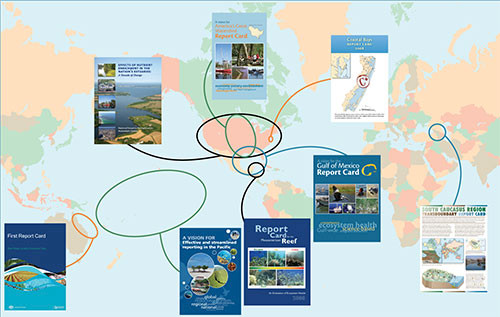
The next chapter for EcoCheck includes a relocation of staff; Caroline Wicks to the UMCES Annapolis Office, co-located with the National Socio-Environmental Analysis Center (SESYNC), and Alex Fries and Jonathan Kellogg to the Integration and Application Network building on the Horn Point Laboratory campus. A major revision of the Chesapeake report card is underway, as are various report card projects (e.g., Mississippi River basin report card).
A testament to the success of the NOAA/UMCES EcoCheck partnership is the seamless transition to a vibrant, ongoing science program, denoted with a new EcoCheck logo and revamped website. Dr. Russell Callender, the new Director of the National Centers for Coastal Ocean Science (NCCOS) has indicated an interest in developing an ongoing relationship with EcoCheck, and EcoCheck staff will be available to support NOAA efforts on a project-by-project basis, including the Coral Reef Conservation Program.
About the author
Bill Dennison

Dr. Bill Dennison is a Professor of Marine Science and Interim President at the University of Maryland Center for Environmental Science (UMCES).
